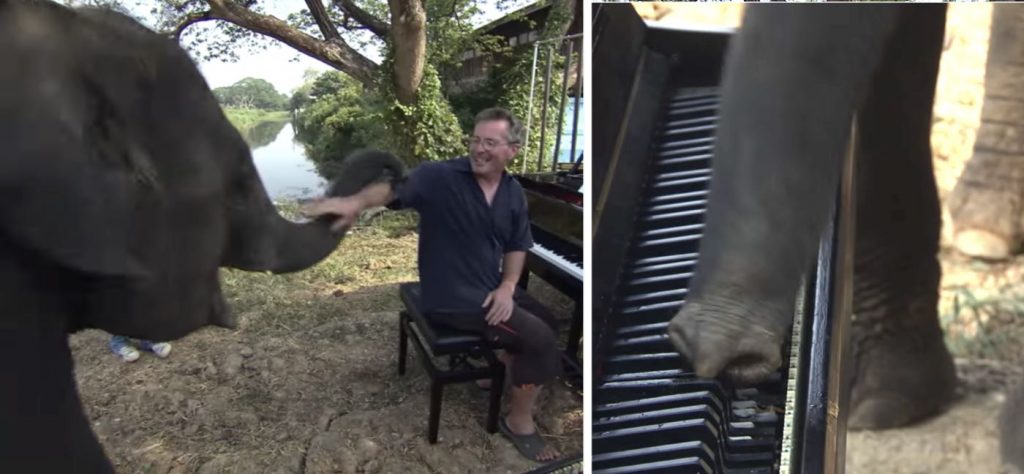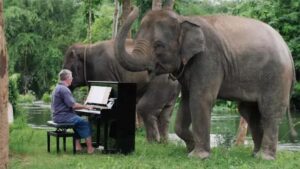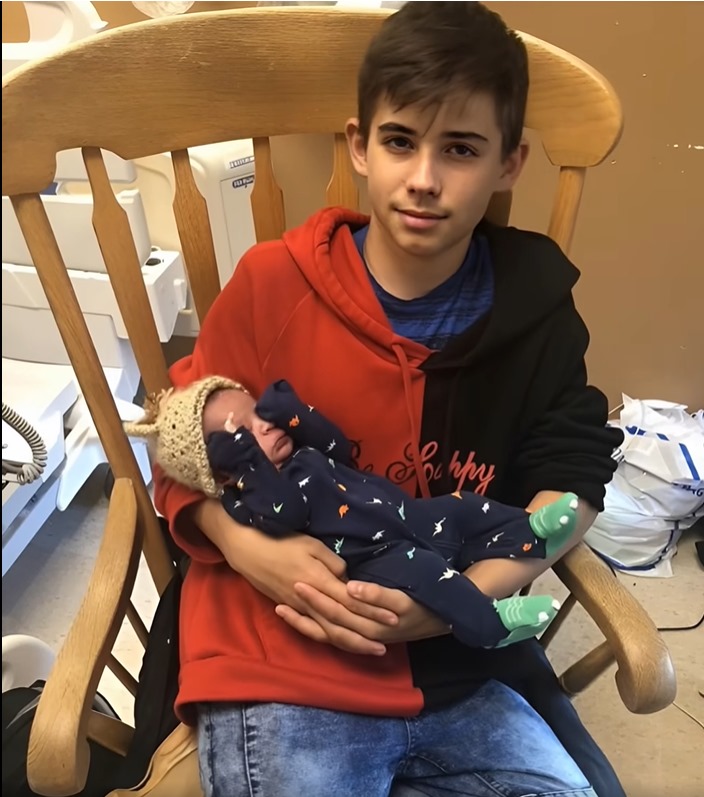Music Beyond Humans: A Pianist Who Played for Elephants
Barton had spent his life perfecting the art of music. A concert pianist with years of training and a career built on grand stages, he knew the applause of audiences, the glow of lights, the hushed reverence of people listening to Beethoven or Chopin. And yet, somewhere deep inside, he felt something was missing. Music was powerful, yes—but he wondered if its magic could reach beyond human ears.

In 1996, Barton and his wife traveled to Thailand in search of adventure. What they found was something far greater: a calling. In the lush hills near Kanchanaburi in northern Thailand, they discovered Elephants World, a sanctuary dedicated to caring for elderly, sick, and rescued pachyderms. Many of these elephants had endured lifetimes of hardship—forced labor, abuse, neglect—and now spent their final years in peace among caregivers who understood their pain.

Barton and his wife became part of that mission, devoting themselves to the gentle giants. For ten years, they worked among them, feeding, bathing, and healing. But while Barton’s hands carried food and water to the elephants, they also ached to carry something else—music. He had long dreamed of playing for animals, of testing whether the language of melody could bridge the gap between species.
One day, he decided to try.
He hauled his piano up the mountain, a massive undertaking in itself, to where the elephants roamed freely. The moment was quiet, almost sacred. As he sat at the piano and struck the first notes of Beethoven, something extraordinary happened. The elephants stopped. They listened. And among them, a blind elephant named Pla-Ra reacted with a depth of stillness Barton would never forget.

“Each time I played music for Pla-Ra, whether flute or piano, there was an identical reaction,” Barton recalled. “Pla-Ra would stand for a while, then curl his trunk and hold it in his mouth until the piece was over. No matter how long the piece was, he would stay like that.”
It was as if the elephant understood. As if, despite the years of pain and darkness, the music opened a window into calm, a reminder of beauty. Barton played, and Pla-Ra listened faithfully, eyes clouded but spirit alive.
The elephants responded in other ways, too. Some drew near, curious. Others reached out with their trunks to touch the piano, even pressing the keys with clumsy grace, as though trying to join in. Barton realized then that this was no novelty—this was communion.
He filmed the moment and shared it online, hoping to raise donations for the sanctuary. What he didn’t expect was how far the video would spread. People around the world were mesmerized by the sight of elephants—so often seen as symbols of strength—standing perfectly still, soothed by a human’s song. The clip went viral, sparking not only awareness but also donations that kept the sanctuary alive.
For Barton, though, it wasn’t just about fundraising. It was about recognizing the universal language of compassion. If music could move elephants—creatures with memories and emotions as vast as their size—then perhaps it was proof that art is never confined by species. He began hosting regular concerts for the elephants, letting the forest, the hills, and the animals themselves become his new concert hall.

The story of Barton and his audience of elephants eventually became a documentary, Music for Elephants, capturing the breathtaking connection between pianist and pachyderm. But for Barton, the true legacy wasn’t the documentary, the viral fame, or even the applause of viewers across the globe. It was the simple, wordless bond that grew each time he pressed a key and an elephant listened.
He had set out to bring music to them. What he found was that they gave something back: proof that kindness, patience, and beauty can transcend language, culture, and even species.
My 15-Year-Old Son Just Became A Dad — But That’s Not Even The Hardest Part

One day, my 15-year-old son, Zach, texted me from school asking if I could pick him up right away. His message was short, almost abrupt, and it carried a weight that instantly made me uneasy. When he got in the car, he barely looked at me. His face was pale, his hands shaking against his jeans. I asked if he had gotten into trouble, if maybe he’d fought with someone, but his voice cracked when he answered: “It’s not about me. It’s about her.” That’s when I learned my son had just become a father.
In a blur of words, Zach explained that his girlfriend had given birth earlier than anyone expected. She had left the hospital suddenly, overwhelmed and afraid, without signing the discharge papers for their newborn daughter. Somehow, Zach—my boy who still needed reminders to pack his lunch and finish his homework—had signed them instead. My first reaction was disbelief. I thought he was making some wild, desperate joke. But then I saw the tears in his eyes, the panic mixed with something else—something fierce, like determination. He said, almost in a whisper, “She’s mine. I’ll take care of her. I don’t want her to be alone.”

It felt impossible, absurd even, that my teenage son was speaking about raising a child. The questions tumbled in my mind: How could he possibly manage school and fatherhood? How would he provide for a baby when he could barely care for himself? But beneath the fear, I sensed his sincerity. Zach wasn’t running away from responsibility; he was stepping into it. He had no idea how hard it would be, but he was ready to try.
We contacted social services right away, hoping for guidance. The caseworkers were kind but blunt: Zach couldn’t do this alone. He was too young, too inexperienced, too unprepared. Still, he kept repeating, “I’m ready. I’ll figure it out.” In his voice, I heard echoes of the little boy who used to build forts out of blankets and insist he could sleep outside to “protect the family.” That same spirit was there, only now the stakes were real.
The months that followed were some of the hardest and most illuminating of our lives. Nights became a haze of crying, bottle-feeding, and diaper changes. Zach, who used to roll his eyes at chores, now dragged himself out of bed at 3 a.m. to soothe his daughter. There were moments he broke down, overwhelmed by exhaustion and frustration. More than once he whispered that he wasn’t good enough, that maybe his daughter deserved someone stronger, older, wiser. And every time, I reminded him: we’d figure it out together.

Slowly, almost imperceptibly, Zach began to grow into his role. He learned how to cradle his daughter just right so she’d stop crying. He figured out the rhythm of feedings, the careful patience required to change diapers without flinching, the soft rocking that could lull her back to sleep. His clumsy inexperience gave way to a quiet confidence. I watched my son transform—his shoulders straightening, his focus sharpening, his heart widening in ways I never expected from a 15-year-old.
Then, one afternoon, his girlfriend came back. She was nervous, apologetic, and overwhelmed, but she wanted to try again. She wanted to be part of their daughter’s life. At first, Zach was wary. He had carried the weight alone for weeks, and the thought of sharing that responsibility stirred up fear and anger. But little by little, the two of them began to talk. They agreed to co-parent, fumbling their way through the delicate balance of teenagehood and parenthood. It wasn’t perfect—there were arguments, misunderstandings, and setbacks—but they were trying, together.
As a parent, I had always imagined guiding Zach through the usual teenage milestones: teaching him to drive, helping him with college applications, cheering from the sidelines at soccer games. I never imagined guiding him through fatherhood before he even had his high school diploma. But life doesn’t always follow the script we write for it. Watching Zach change from a distracted teenager into a devoted father was both humbling and extraordinary.
He taught me something I never expected: that growth isn’t about being flawless or having all the answers. It’s about facing challenges head-on, adapting to circumstances you never dreamed you’d be in, and accepting help when you need it. Zach showed me that resilience is born from love, and that sometimes the most profound lessons come from our children.
Now, when I look at him holding his daughter, I don’t just see my son anymore—I see a young father learning, stumbling, but standing tall. He is proof that even in the most unlikely situations, strength can emerge, and love can light the way forward.





